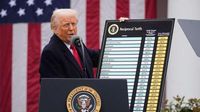On April 4, 2025, U.S. President Donald Trump officially imposed new tariffs on trading partners worldwide, including Ukraine and Switzerland, as part of a sweeping trade policy shift. This move, which has raised eyebrows and concerns among international trade experts, will see Ukraine facing a 10 percent tariff on its exports to the United States, while Swiss exports will incur a staggering 32 percent increase in costs due to the new tariffs.
Ukrainian Economy Minister Julija Swyrydenko addressed the implications of these tariffs, stating that while the situation is "challenging, but not critical," the new tariffs will affect Ukrainian exports significantly. In 2024, Ukrainian exports to the U.S. totaled approximately $874 million, which included $363 million of pig iron and $112 million of pipes. In contrast, Ukraine imported goods worth $3.4 billion from the U.S. Swyrydenko emphasized that the tariffs on American goods entering Ukraine are relatively low, with only a 10 percent tariff on cars and no tariffs on coal and oil. This situation provides Ukraine with an opportunity to negotiate better terms, as noted in her remarks on Facebook.
"This gives us the chance to negotiate other conditions— the U.S. statement explicitly mentions this possibility. If nothing changes, the universal U.S. tariffs will primarily impact small producers," Swyrydenko noted, underscoring the urgency for Ukraine to secure favorable trade agreements amidst the ongoing conflict with Russia.
Interestingly, Russia is notably absent from Trump's tariff list, as U.S. sanctions already preclude significant trade with the country. Trump's spokesperson, Karoline Leavitt, explained that the sanctions effectively eliminate any substantial commerce with Russia, which remains a focal point of the ongoing geopolitical tensions.
The ramifications of these tariffs extend beyond Ukraine, as Robert Habeck, Germany's Economy Minister, characterized Trump's tariff package as the most disruptive tariff increases seen in 90 years. He drew parallels between the U.S. tariff policy and the ongoing war in Ukraine, suggesting that the economic impact could weaken European support for Ukraine in the long run. Habeck stated, "The portrayal by Trump that the United States is at a disadvantage in its trade relations is incorrect. Globalization means that we work collaboratively on a global scale, and the U.S. has been one of the biggest beneficiaries of this system."
Habeck's comments resonate amid fears that rising living costs and economic pressures in Europe could diminish public support for continued assistance to Ukraine. As the EU grapples with its own economic challenges, the potential for decreased financial aid to Ukraine looms large, raising concerns about the future of the conflict and the West's commitment to supporting Ukraine.
In Switzerland, the economic impact of Trump's tariffs has also sparked significant concern. Christoph Mäder, head of Economiesuisse, highlighted that Swiss exports to the U.S. will now cost 32 percent more due to the tariffs. He warned that these tariffs will severely impact the Swiss export economy, causing significant uncertainties. Mäder emphasized the need for Switzerland to maintain stable trade relations with the EU, which remains the most important export market for the country.
"The tariffs hit the Swiss export economy hard and create great uncertainties," Mäder stated in an interview. He further advised against implementing countermeasures, advocating instead for a continued commitment to openness in trade relations. The Swiss government, in its initial response, indicated a preference for calm and understanding rather than retaliatory measures.
Economiesuisse's stance reflects a broader sentiment among Swiss businesses, who see the need for stable and reliable trade partnerships, particularly with the EU. Mäder pointed out that the ongoing discussions around the bilateral agreements with the EU are crucial, especially in light of the potential disruptions caused by the new tariffs.
As the EU prepares to respond to Trump's tariffs, additional tariffs of 20 percent on imports from the EU are also on the table, further complicating the trade landscape. The EU Commission and member states are currently devising countermeasures, although the legal framework allows for a range of options that may not be immediately implemented.
The broader implications of these tariffs are yet to be fully understood, but experts are already warning that the potential for increased economic strain in Europe could have long-lasting effects on international trade relations. If the EU experiences rising costs and economic difficulties, the political support for Ukraine could wane, complicating efforts to provide ongoing assistance to the war-torn nation.
The situation remains fluid as stakeholders in both Ukraine and Switzerland navigate the challenges posed by these new tariffs. The coming weeks and months will be critical as countries assess their responses and work to safeguard their economic interests in an increasingly turbulent global trade environment.
In summary, the introduction of new tariffs by the Trump administration is set to reshape trade dynamics not only for Ukraine and Switzerland but also for the broader international community. Stakeholders are urged to remain vigilant as the situation evolves, seeking to mitigate negative impacts while fostering strong trade relationships.





